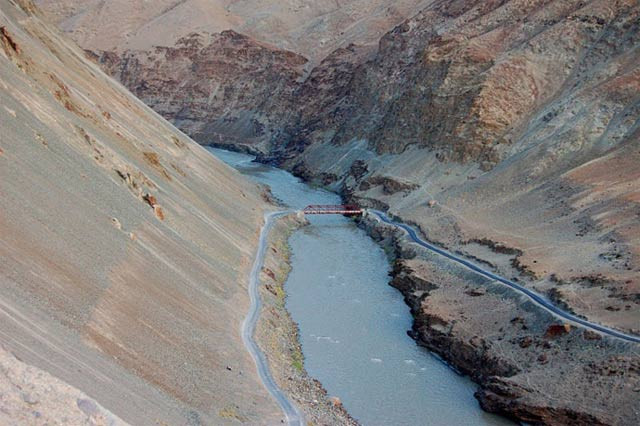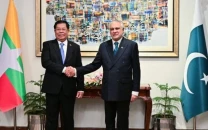Pakistan vows to protect water share under IWT
The treaty brokered by World Bank withstood wars, several phases of tensions and other crises between two countries

Pakistan will take all appropriate steps to safeguard its due share of water, guaranteed by the Indus Waters Treaty (IWT), declared Foreign Minister Ishaq Dar, who chaired a high-level meeting on Monday to discuss the country's strategy in the wake of Indian move on the critical water accord.
The meeting was attended by the ministers for law and justice and water resources, attorney general, senior officials and technical experts, according to an official handout issued by the Foreign Office.
The meeting was convened to prepare Pakistan's strategy after India suspended the IWT of 1960, following an attack on tourists in the Pahalgam area of the Indian Illegally Occupied Jammu and Kashmir (IIOJK) on April 22.
The Indian decision was part of its raft of measures to penalize Pakistan for its alleged role in the killing of tourists in the disputed region. Islamabad vehemently denied New Delhi's charge and offered to be part of any "neutral, transparent and credible" investigation.
While there are fears of potential military fallout of the current crisis, the most significant issue at the moment is the fate of the IWT that governs the sharing of water from 6 rivers that pass through India.
The treaty brokered by the World Bank withstood wars, several phases of tensions and other crises between the two countries.
But for the first time, the Indian government decided to use water as a weapon, a move that triggered a strong response from Islamabad, which warned that any attempt to divert, stop or reduce water belonging to Pakistan would be treated as an act of war.
The foreign minister, according to the statement, emphasized that Pakistan will take all appropriate steps to safeguard its due share of water, guaranteed by the Treaty.
He underscored that India's unilateral and illegal move to hold the Treaty in abeyance contravened the established norms of inter-state relations, international law, and the IWT's own provisions.
He stressed that the Treaty is critical to regional stability and its sanctity must be preserved. Noting that the waters of the Indus River System remain a lifeline for Pakistan's 240 million people, he deplored the Indian attempts to weaponize water.
He reiterated that Pakistan will continue to advocate for the full implementation of the Treaty to ensure the protection of its water rights and the well-being of its people.
The IWT was signed in 1960 between India and Pakistan, with the World Bank as a broker and guarantor. It allocates Eastern riversRavi, Beas, Sutlejto India and Western riversIndus, Jhelum, Chenab-to Pakistan.
India receives about 33 million acre-feet or 20% of the total 168 million acre-feet of water, of which it utilizes 9394%. The remaining unutilized water flows to Pakistan.
According to officials, the Treaty has no unilateral exit clause. Article 12 of IWT clearly states that "the provisions of this Treaty shall continue in force until terminated by a duly ratified treaty concluded between the two governments."
Under international law, particularly the "Vienna Convention on the Law of Treaties (1969)," a state cannot withdraw from a treaty unless either parties consent or the treaty itself allows for it.
The IWT is state-specific, not regime-specific, and legally binding. India cannot revoke the treaty unilaterally under Article 12(4) of IWT.
The IWT provides a structured dispute resolution mechanism including bilateral talks, a Neutral Expert (Annex F), and a Court of Arbitration (Annex G). Pakistan can invoke Article 9 to escalate the matter.
Experts are of the opinion that India cannot physically suspend the IWT without massive, long-term infrastructure projects. Natural river flow, geographic constraints, and military escalation risks make unilateral action strategically unfeasible, according to experts.
They also point out that unilaterally suspending the treaty would violate international law and will set a dangerous precedent for upper riparian states like China. China might follow India's precedent by suspending water flow to India in the Brahmaputra River.
Experts believe that suspension of the IWT would pose a severe threat to Pakistan's water security, impacting agriculture, drinking water, and food supply, likely prompting Islamabad to pursue legal and diplomatic recourse through the UN, ICJ, and World Bank mechanisms.
Pakistan can also approach the UN Security Council under Article 35 of the UN Charter, which allows any UN member state to bring a dispute or situation likely to endanger international peace and security to the attention of the Council.
Pakistan can form alliances with other lower riparian stateNepal, Bangladesh, Bhutanfor collective water diplomacy. The IWT has served as a stabilizing force in South Asia, its disruption could escalate geopolitical tensions, risk environmental degradation, and destabilize millions who depend on the Indus basin, according to officials.
Pakistan already warned that unilateral suspension could destabilize key bilateral agreements like the Simla Agreement (1972), Karachi Agreement (1949), and vital CBMs, signaling India's willingness to bypass structured diplomacy and potentially unravel the broader Indo-Pakistani diplomatic framework.



















COMMENTS
Comments are moderated and generally will be posted if they are on-topic and not abusive.
For more information, please see our Comments FAQ